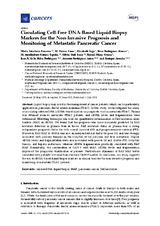Mostrar el registro sencillo del ítem
Circulating Cell-Free DNA-Based Liquid Biopsy Markers for the Non-Invasive Prognosis and Monitoring of Metastatic Pancreatic Cancer
| dc.contributor.author | Toledano-Fonseca, Marta | |
| dc.contributor.author | Cano, M. Teresa | |
| dc.contributor.author | Inga, Elizabeth | |
| dc.contributor.author | Rodríguez-Alonso, Rosa | |
| dc.contributor.author | Gómez-España, M. Auxiliadora | |
| dc.contributor.author | Guil-Luna, Silvia | |
| dc.contributor.author | Mena-Osuna, Rafael | |
| dc.contributor.author | Haba-Rodríguez, Juan R. de la | |
| dc.contributor.author | Rodríguez-Ariza, Antonio | |
| dc.contributor.author | Aranda Aguilar, Enrique | |
| dc.date.accessioned | 2020-07-02T09:38:36Z | |
| dc.date.available | 2020-07-02T09:38:36Z | |
| dc.date.issued | 2020 | |
| dc.identifier.uri | http://hdl.handle.net/10396/20280 | |
| dc.description.abstract | Liquid biopsy may assist in the management of cancer patients, which can be particularly applicable in pancreatic ductal adenocarcinoma (PDAC). In this study, we investigated the utility of circulating cell-free DNA (cfDNA)-based markers as prognostic tools in metastatic PDAC. Plasma was obtained from 61 metastatic PDAC patients, and cfDNA levels and fragmentation were determined. BEAMing technique was used for quantitative determination of RAS mutation allele fraction (MAF) in cfDNA. We found that the prognosis was more accurately predicted by RAS mutation detection in plasma than in tissue. RAS mutation status in plasma was a strong independent prognostic factor for both overall survival (OS) and progression-free survival (PFS). Moreover, RAS MAF in cfDNA was also an independent risk factor for poor OS, and was strongly associated with primary tumours in the body/tail of the pancreas and liver metastases. Higher cfDNA levels and fragmentation were also associated with poorer OS and shorter PFS, body/tail tumors, and hepatic metastases, whereas cfDNA fragmentation positively correlated with RAS MAF. Remarkably, the combination of CA19-9 with MAF, cfDNA levels and fragmentation improved the prognostic stratification of patients. Furthermore, dynamics of RAS MAF better correlated with patients’ outcome than standard CA19-9 marker. In conclusion, our study supports the use of cfDNA-based liquid biopsy markers as clinical tools for the non-invasive prognosis and monitoring of metastatic PDAC patients. | es_ES |
| dc.format.mimetype | application/pdf | es_ES |
| dc.language.iso | eng | es_ES |
| dc.publisher | MDPI | es_ES |
| dc.rights | https://creativecommons.org/licenses/by/4.0/ | es_ES |
| dc.source | Cancers 12(7), 1754 (2020) | es_ES |
| dc.subject | Cell-free DNA | es_ES |
| dc.subject | Liquid biopsy | es_ES |
| dc.subject | MAF | es_ES |
| dc.subject | Pancreatic cancer | es_ES |
| dc.subject | RAS mutation | es_ES |
| dc.title | Circulating Cell-Free DNA-Based Liquid Biopsy Markers for the Non-Invasive Prognosis and Monitoring of Metastatic Pancreatic Cancer | es_ES |
| dc.type | info:eu-repo/semantics/article | es_ES |
| dc.relation.publisherversion | http://dx.doi.org/10.3390/cancers12071754 | es_ES |
| dc.rights.accessRights | info:eu-repo/semantics/openAccess | es_ES |

